×
It would be fair to say that in forty one Big Personality interviews so far, the vast majority of people have had a little surprise or two woven into their life’s tale. Some of these personalities I know well, some I don’t know at all and others I know only from eating in their restaurants, shopping in their shop or listening to their band. Whatever the situation, if I have asked them to chat then I usually have a sense of who they are and what might make them tick.
So, as I was preparing to meet up with Praveen Kumar of Tabla Restaurant I felt sure I had a good fix on the man I was about to meet. Always smiling, impeccable in his welcome and with an air of proper, old-fashioned manners and gentlemanly behaviour, I expected a tale of a mild man, perhaps second-generation Indian with a family history in restaurants there to explain his almost innate sense of how to do hospitality well. This preconceived notion was bolstered when he arrived at Parklands to meet for morning coffee, carrying a beautiful bunch of flowers for me and a bag full of family photographs.
However, I was to discover that our friend from South Street has a quiet, feisty side that has carried him on a single-minded journey from a small village in the South of India, via five star establishments, through Montego Bay and finally to our Small City of Perth. His tale is epic (I made him agree if he ever does a book that I can be his Ghost Writer) and strengthened with the love of his family, the traditions of his homeland and a genuine gratitude and humble respect for the village that made him the man, husband and father that he is today.
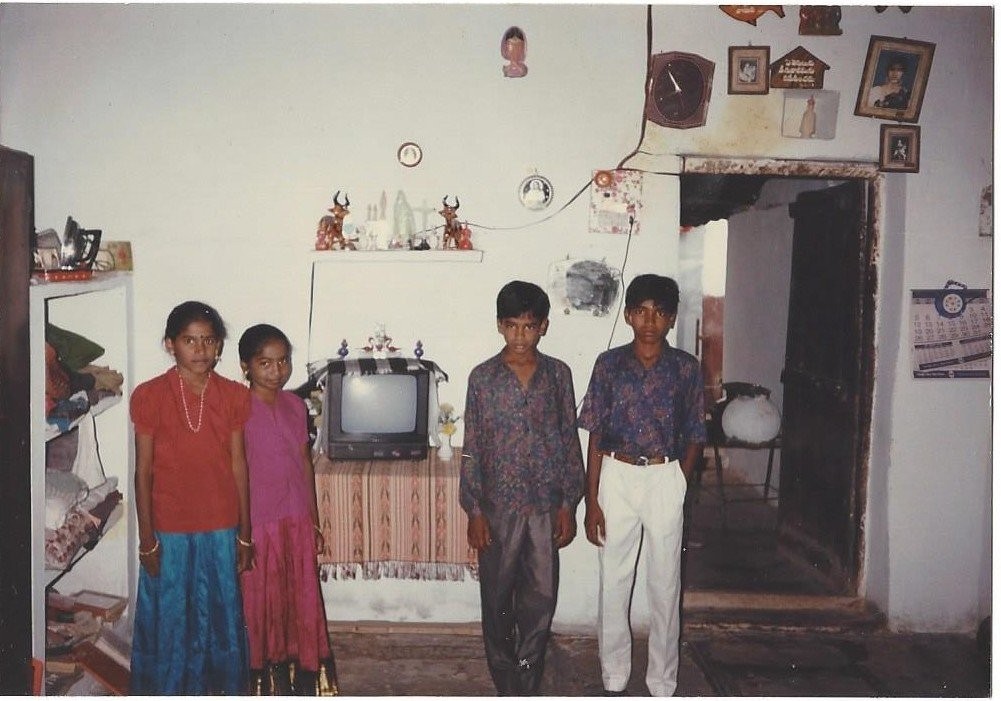 Praveen was born in 1979 in a small village called Mattampally which is near Hyderabad in South India. The village is small, with only 1500 inhabitants who all rely on the rich agricultural land for their living.
Praveen was born in 1979 in a small village called Mattampally which is near Hyderabad in South India. The village is small, with only 1500 inhabitants who all rely on the rich agricultural land for their living.
“Growing up, there was still a caste system of sorts with villages split into priests, landlords, tradesmen and labourers. My grandfather had inherited our family spice farm from his grandfather and so we owned some land and were landlords in our village – this didn’t make us rich but it gave my grandfather and father respected positions.
We grow chillies mainly, sun-dried chillies, and chickpeas, tamarind, mustard seeds, cumin, cotton and bay leaves and other spices. Our family home was a small building with a main living area, a kitchen and a hall. There were no bedrooms for us kids, we just pulled down beds in the communal areas at night time. You didn’t need a fridge because you walked outside and picked what you were eating that night; if we had too much, say Okra, then we’d give it to my aunt next door, or to my granny or another neighbour and they’d do the same for us when they had extra.
In a community like this, where it’s all about family and agriculture, no-one ever goes hungry, everyone shares the crops and food and plays their role in keeping things going. So, if I need my cart fixed, then I call the tradesman who fixes carts – and he will have inherited his trade and his living from his father. It’s how it works.”
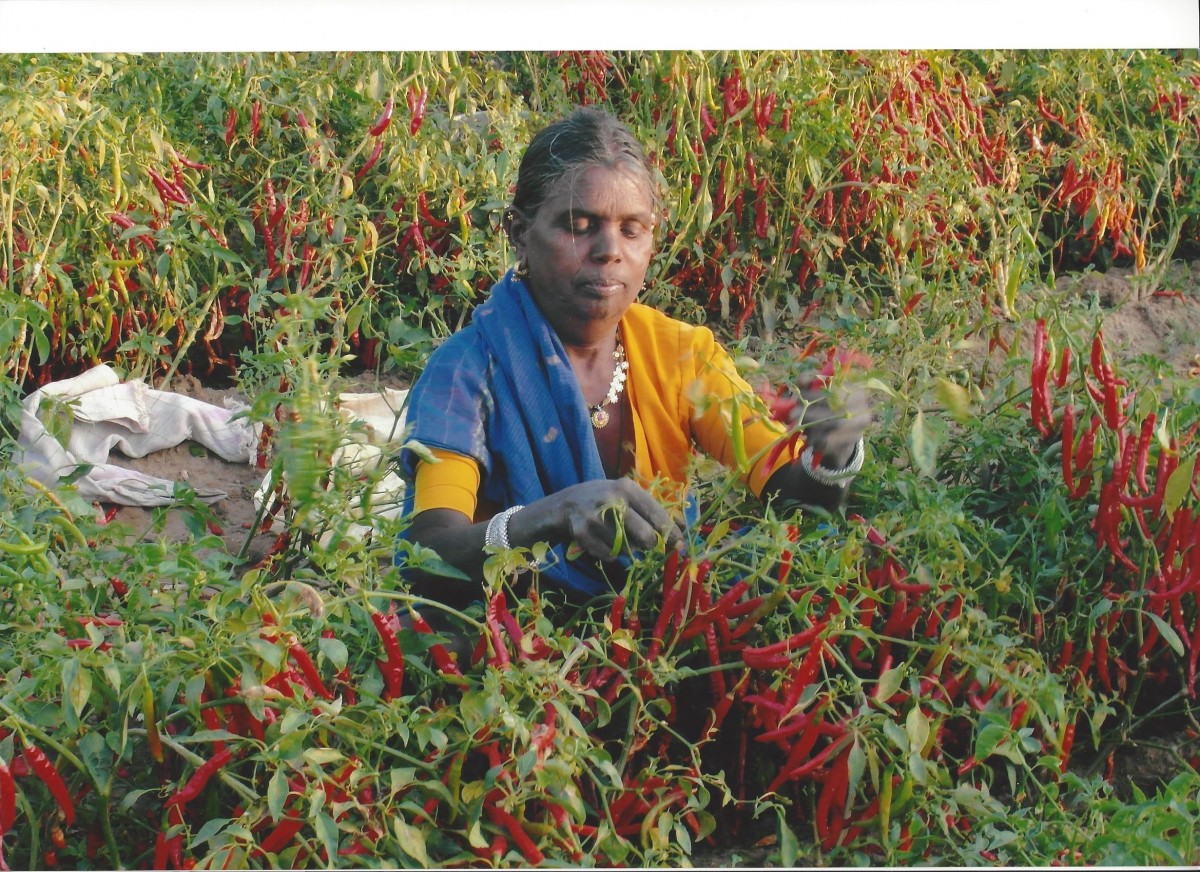
Praveen paints a picture of a happy, simple childhood where he went to ‘so-called-school’ and was called upon by anyone in the village who happened to need a tree climbed! “I was a good climber, five or six years old and so thin. I’d always be the one sent up my Auntie’s coconut tree. I was fearless, so fearless. As I got older my thing was planning – so if there was a festival or a party to be organised I’d get called in to pull it all together.”
School was ‘so-called’ because you went along from 9am to 3pm and if you liked it you’d listen, but if you didn’t you could just play and carry on.
“In a village like mine you needed real skills, no-one cared about school. What you needed to know was how to do a seed, read the soil, how to treat your buffalo and feed them. My grandfather used to say ‘what are you going learn in school?’ He taught me all the things a boy needs to know to inherit a farm – when I go back to the village now I can still go to the field and help my cousins. That’s what I’m going to do when I retire!”
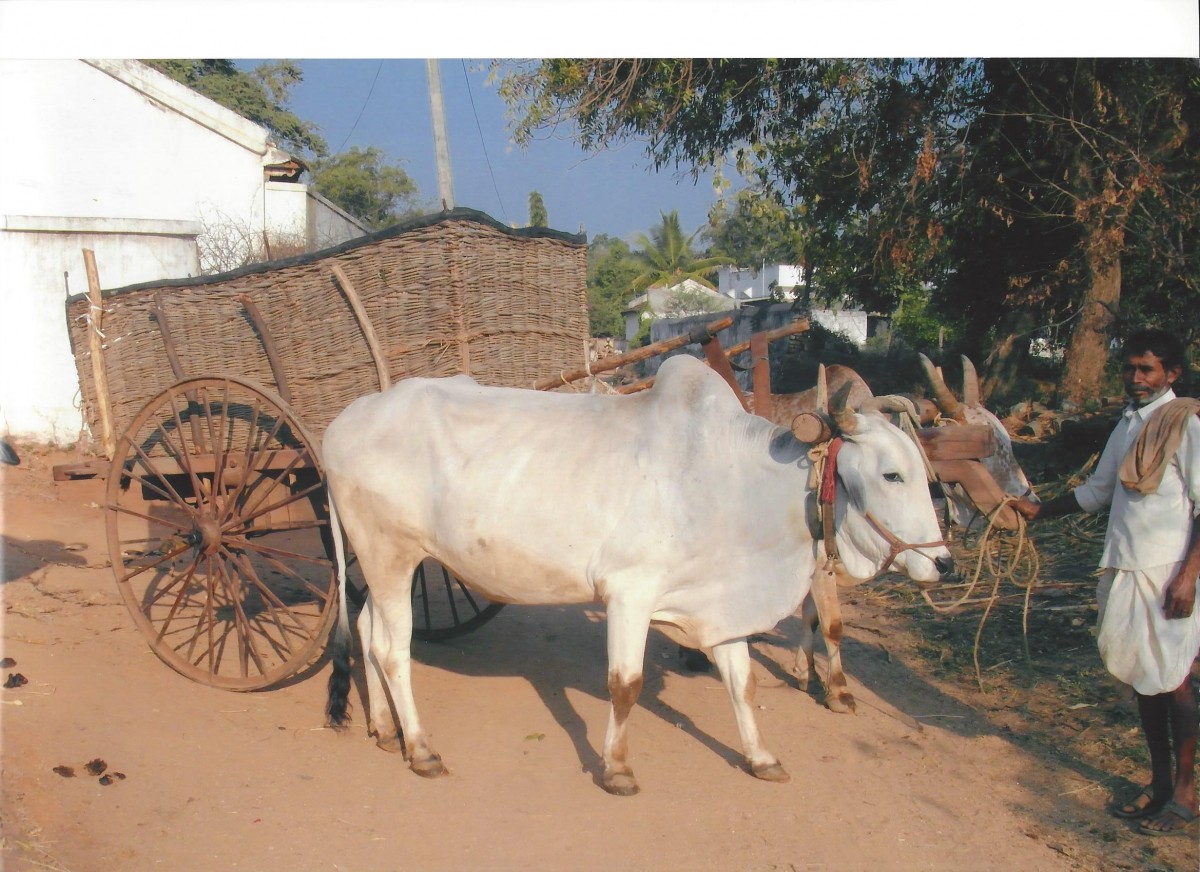
By the time Praveen is 14, he is still in shorts, still a skinny boy and his basic reading and writing skills are all in his native language of Telugu. What he can see in front of him though, is the village priest who is looked after by the people and given offerings of food from each different family. The village is Catholic and the priest holds the highest place in the communal system with a luxurious life that includes a house, a maid, a car, a refrigerator and a colour TV.
“And my aunt was a Nun, and she was by far the most educated person in our family. All I could see was this life that I wanted to be part of and so I decided I’d become a priest. Not the right reasons for joining at all but you know, I was young and I thought this would be the way to a nice life. So I went to my father Bala Reddy for his approval; he wasn’t convinced at first but he agreed and I went with three other boys from my village to join the Seminary.
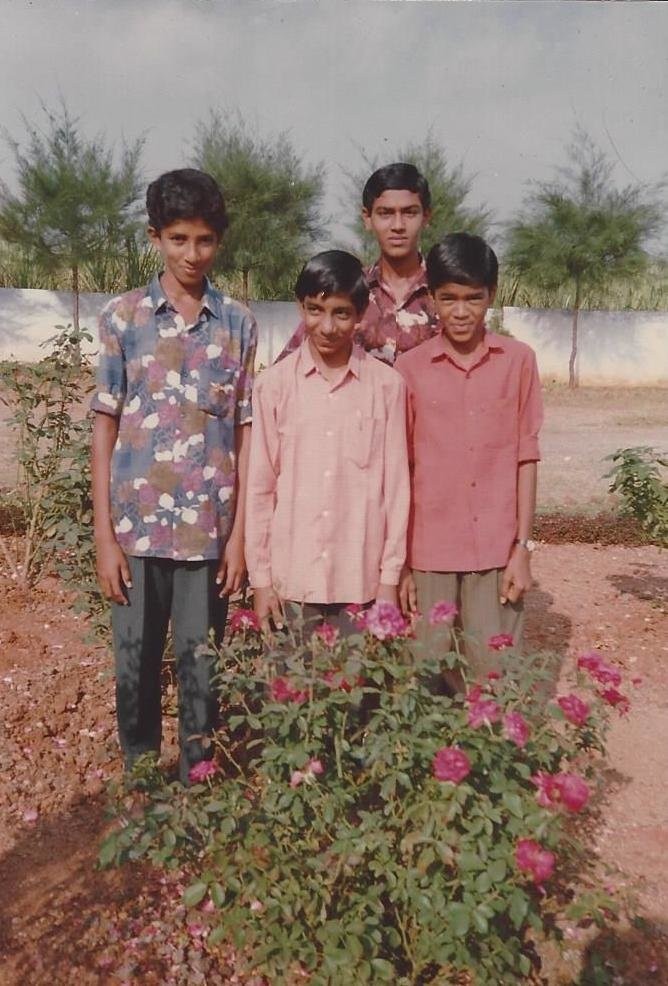 The first year was good – I learned English, I read the bible and I was sent to college to be educated. Everything we needed was there. We were given food, clothing and the luxury of one phone call every week. My mum and dad would wait by the only phone in our village so I could call them and tell them about my life.
The first year was good – I learned English, I read the bible and I was sent to college to be educated. Everything we needed was there. We were given food, clothing and the luxury of one phone call every week. My mum and dad would wait by the only phone in our village so I could call them and tell them about my life.
The only problem was, I was still a bit naughty – I was training to be a priest but I was outspoken and I liked to chat to girls. Eventually as the years progressed I settled, I learned that my actions affected others and slowly I came to realise I had to be a more thoughtful person. Out of the thirty eight that started only three went on to become priests. We knew nothing of the world, nothing of this big city we were allowed out into four hours each week – we had mainly seen a way out of village life.
What happened next was that the rector took me out for a day, shopping for groceries in the city. He had become like a mentor to me and so when he asked me ‘What do you want in life?’ and I replied ‘I want to live like you. With the car and the house and the easy life!’ He then asked me ‘Can you not get this another way?’. It was a question that needed no answer and he was right of course. He knew I was bright and that I’d be an asset to the seminary but he wanted what was best for me.”
The rector called Praveen’s Dad, which was normally to tell a parent that their child had been misbehaving! He sat his Dad down and explained that Praveen had too much energy, too much character to live the life of a priest. He painted a picture of a young man who was constrained by the boundaries of priesthood, who couldn’t flourish or fulfil his potential through life in the Seminary. He then explained that Praveen had picked up accounts and commerce easily and quickly – and that if there was an event to be arranged he was the young man that everyone wanted on side.
“No doubt in my mind that my mentor changed my life with that conversation. He gave my dad a list of things I could be – an accountant, an economist, a planner… But I already had other ideas! I’d been chatting to one of the other guy Ravi and he showed me this photograph of these ships and amazing buildings like I’d never seen before. It was from his brother who worked for Disney Cruise Liners at the time – he was always sending my friend gifts from America, like new trousers and sunglasses. I was gripped by it all.
So I asked him, ‘what does your brother do?’ and when he told me I thought I’d write him a letter. I introduced myself, I told him I wanted a life like his and I sent it to his address in America. About three months later he wrote back and said ‘Yes Praveen, this is a nice life in these hotels but you have to do long hours and work hard.’ But I was used to doing 12 hour shifts in the fields helping my Dad, hard work didn’t frighten me at all. I still have that letter, in a trunk back home.”
Praveen was inspired! He decided there and then that he wanted to study Hotel Management and go to work in America. He showed the letter to his Dad who was outraged at first. He saw this job as one of a waiter – not fit for the son of a landlord. Now, rightly or wrongly this mattered a great deal; charged with the list that he had been given by the rector showing his son as an accountant or an economist, his Dad refused to entertain the idea of Praveen studying to work in hospitality.
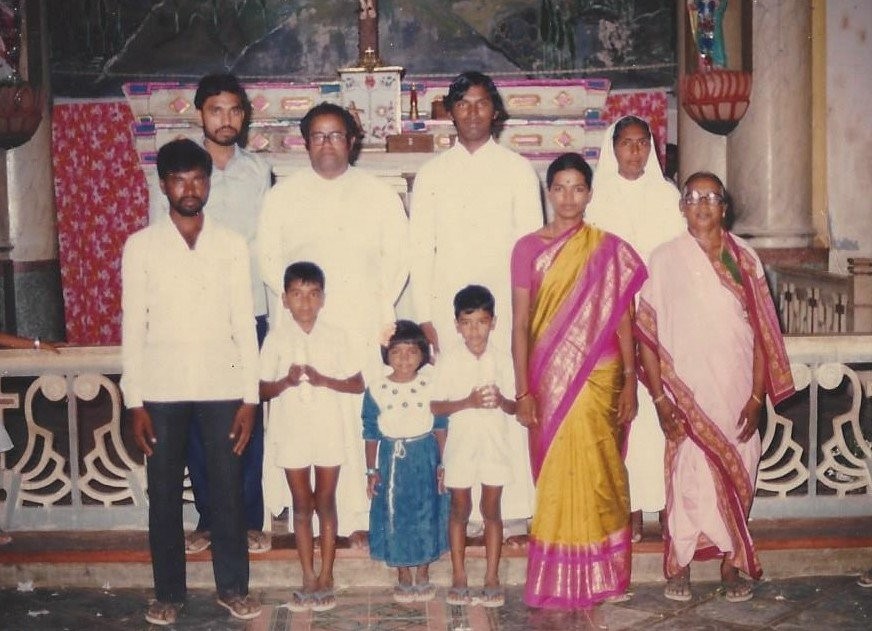
“The big problem was he had this idea of me as a waiter, a labourer because we don’t go to hotels in my village. If you want to celebrate you kill a goat, or you kill ten chickens or you send someone to the pond to catch a big fish. You pour a nice kick of Toddy from the palm tree and you have a celebration in the house. That’s it. No hotels.
I had looked into it all and I knew where I could study, what the college applications looked like, the fee structure and the prospects. In India there is no public funding of students and so there was no way for me to do this without my father’s support and blessing. I needed him on side both to pay and to give me his blessing. Looking back, I realise I had no idea what I was asking for. The fees were 100,000 rupees a year which back then was £1000. To put that in perspective it would feed a family of four for a year, it would build a house. And I was asking him to pay that for an eduction, every year for four years. It was a huge ask. Huge.”
But he had no real idea of this at the time – he was driven by the photograph of big ships and five-star luxury. It was all he could see. This vision of him managing these awe-inspiring buildings was a force to be reckoned with. So he decided to enlist the help of his favourite uncle Joji Reddy, a successful poultry farmer who lived in the city.
“My uncle was close to me in age and I respected him hugely. When I finished at the seminary I went to work on his farm for the summer. We would chat about what I wanted to do and I told him my vision, my dream of the hotels and America. He could see it – he had the confidence in me and he believed I could achieve it.
Remember I’d already asked my Dad and his reaction had been “You would spend 400,000 rupees to become a waiter? No.” So my uncle came to talk to him and he said “What are you going to do with this land if he doesn’t want it? What does Praveen want to do?” and my father told him about the list from the rector and the college in the small city next to us that could help me achieve those things for only £50 a year. My uncle pushed… “Praveen wants to do a different thing. I will loan you the money, interest free for him to go for one year.” Of course my dad was worried about the other three years but I think he suddenly realised how strong my desire was and he sat me down and told me he was going to sell some land to pay for my second year.”
It is here that we need to sit back and remember the vastly different culture that Praveen comes from. To sell land in a small village in India is deeply shameful; it says we can’t afford this or we can’t work this land. No matter how little money it is making, never, ever would you sell land. So Praveen said no, he didn’t want him to do that. The guilt at what he was asking was beginning to grip him but it turns out the decision was made – his dad sold seven acres and there was enough money now for Praveen’s first two years study.
Praveen had started sharing his vision with other people in the village and everyone was excited at the prospect of their friend and cousin going off to the city to run five-star hotels. In 1997 Praveen headed to Vizag to start his degree in Hotel Management and his new life. With all the money the family could muster now poured into fees he knew he couldn’t ask for more and so had to find a way to support himself.
He would study from 8am to 2pm and then head to a gathering point in the city where companies would come down looking for that evening’s labourers - there is no part-time culture in India, you simply work the shift that is available that day. He worked as a kitchen hand, a waiter, a wedding planner. Men would appear and ask for ten labourers, pile them all into an open truck and take them to the event, hotel or restaurant where the job was. He was paid about 100 rupees a shift, around £1, and this covered his rent and his food.
“I couldn’t tell anyone I was studying or that I was the son of a landlord or they wouldn’t have hired me. And my dad was so ashamed that I was a labourer I eventually told him I had a scholarship. In the day I was learning French Cooking, HR, wine skills and more and at night I was doing anything I could to make my rent.
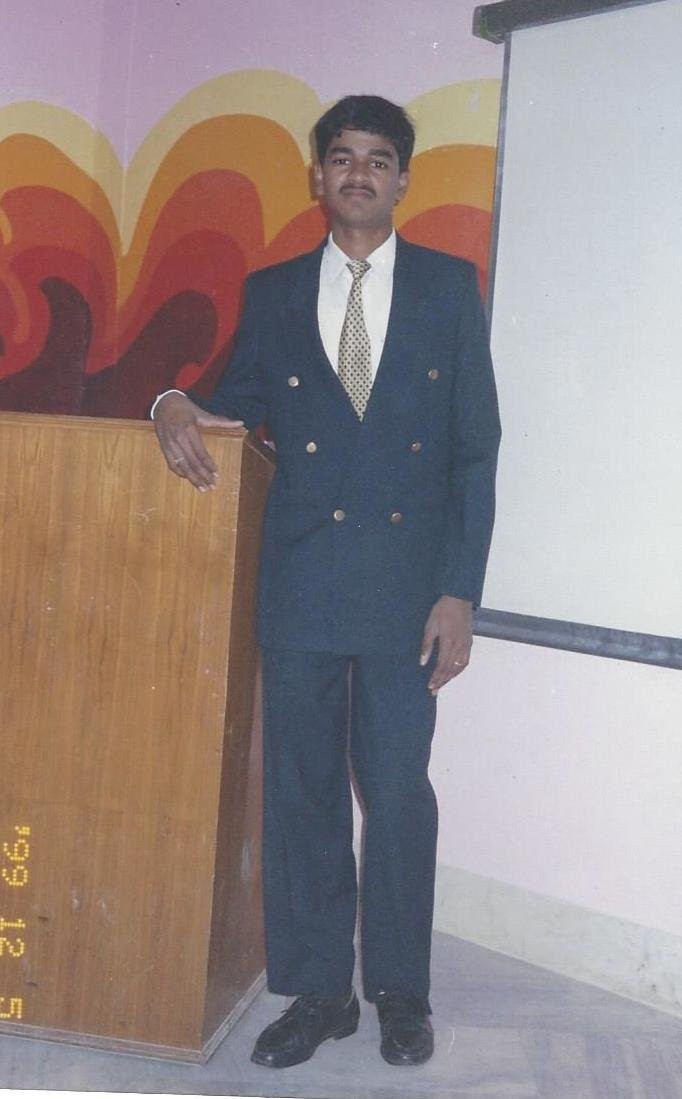 All of my classmates were rich, with wealthy families supporting them. Remember, it was usually only these people who could afford the fees. They didn’t understand why I wasn’t out at the movies or clubbing. I was so tempted and for a while I gave in, letting them pay for me and going along to films, skipping payments on my rent. But I couldn’t enjoy it – I kept thinking what my father would say if he knew where I was and what I was doing. I worried that I wouldn’t achieve what I’d promised if I wasn’t studying. By this time I was in third year and he had taken a loan for the year’s fees. So my rebellion lasted about three months. I couldn’t do it – couldn’t break that trust he had in me.”
All of my classmates were rich, with wealthy families supporting them. Remember, it was usually only these people who could afford the fees. They didn’t understand why I wasn’t out at the movies or clubbing. I was so tempted and for a while I gave in, letting them pay for me and going along to films, skipping payments on my rent. But I couldn’t enjoy it – I kept thinking what my father would say if he knew where I was and what I was doing. I worried that I wouldn’t achieve what I’d promised if I wasn’t studying. By this time I was in third year and he had taken a loan for the year’s fees. So my rebellion lasted about three months. I couldn’t do it – couldn’t break that trust he had in me.”
We chat a bit about this strange life he was in; at college he was the poor boy from the village who had to labour at night to feed himself and who couldn’t afford the lifestyle of his rich friends. But when he returned to the village to visit, they saw him as this big shot superstar, in the city learning how to run luxury hotels. Praveen didn’t let either opinion sway him; he remained single minded and fixed on his goal.
“There was a vacancy in nearby 5-star hotel for a trainee manager’s position. It ran alongside your studies in year four and you would be paid for working. I knew that one of the rich boys in my class would get it; there was one job and thirty eight of us applying so I had decided not to bother. I’m sitting eating lunch one hour after the applications were due in when I think ‘what are you doing?’ and I stood up, leaving my food and I ran to the college to beg for a second chance. My lecturer gave me one hour until he had to leave to take the applications over the city to the hotel. I ran into the street and bribed a typist to quickly do my CV and give me it back within the hour. That typist was to become crucial to my life.”
Twenty four were shortlisted based on their grades and after a round of HR interviews where they established communication skills and general attitude, eight students were sent to be scrutinized by the General Manager. Convinced his English was too broken and his accent wasn’t posh enough he knew all he could do was share his vision and so he painted his picture of America and the five star hotels. He told the tale of studying 8am – 2pm and working at night in kitchens and at weddings. And then our bold Praveen asked him outright for the opportunity. Mr Mumjudar did what any good manager would do – he employed the boy who was learning the guts of his craft while the others were sitting in the movies.
“The trainee job paid 100,000 rupees a year. So I paid my fees in year four and somehow got by. I studied and I worked, going in early and learning everything there was to learn. I invited my dad to the city, to help him understand what this big hotel business was all about. The Park was the first 5-star establishment in the whole state and I think it changed his opinion of what I do.”
After year four Praveen was given a full time job at The Park and he knew he had made all the right choices. His dad as now on side, to the point that he had contacted a distant relative who worked as an educational consultant and told the tale of his son, the five-star hotel manager. This relative secured Praveen an interview at Dublin University to do an MBA in hospitality management and on being accepted Praveen left his job and returned to his village to wait for the visa to arrive.
“I was so impatient. So confident and certain. I realised then that America was really just a symbol for ‘foreign land’ and that I was on my way to my dream. Anyway, the visa was rejected because it was decided there was not enough evidence to prove that I could be supported. Land meant nothing, they wanted to see liquid cash and we had none of that.”
Determined he couldn’t stay in the village and knowing he couldn’t return to the hotel to say he’d made a mistake, he headed to Bangalore and picked up a job as a waiter in St Mark Hotel. He proved he was worth more, going in at 10am and working for free until his shift started at 2pm in the kitchen and housekeeping. He lived in a tiny room with no TV, no mobile phone and he was unhindered by life’s usual frills. ‘All there was to do was work.’
His three month appraisal came round, he explained his vision once again and so as well as being impressed by his work ethic and standards, his boss became sold on this boys’s dream and secured Praveen the next operational manager’s post that came along.
“So I’m working as a assistant food and beverage manager and there is a guy called Anil Kupoor who comes to stay at the big hotel I’m in. He owns eighteen restaurants in the Caribbean and he’s based in Jamaica. I was inspired by him and asked for his guidance. I’m a big believer that you have to share your ideas, share your goals and ask for help from people who know more than you. A month after he left he called the hotel to speak to me and offered me a job. I called my dad to ask for his approval and when he said it was up to me, I said yes right away. This time the paperwork was all handled; Anil paid for my visa, my work permit and sponsored me for a three year contract.”
Praveen was running a fine-dining Indian restaurant Akbar in Montego bay Jamaica and earning enough money to start paying off his uncle’s loan. It was frequented by everyone from the Prime Minister to American Senators and stars like John Travolta. He insisted in helping in the kitchen, cooking at lunchtimes in order to polish his chef skills. His story would be told often as people asked him how he came to be in Montego Bay. One of these people was Kapil Sharma, the Food and Beverage director of Sandals resort.
You can guess the next bit can’t you? Praveen had caught the eye of the Island’s tourism big shots. He had put 40% onto the restaurant’s turnover with his lunchtime ideas and marketing plans. When Kapil offered him a position at Sandals new resort it was little surprise, but there was a problem…
His contract was for three years; he was tied. Amil said no straight away and so Praveen went to his business partner Rajiv and convinced him to release him to work with Sandals full time as long as he promised to work part time for them. He knew that he owed Anil his loyalty so for the remaining eighteen months he did their marketing free of charge and moved up to the position of Assistant Food and Beverage Director position in Sandals.
“My vision was intact but the idea of America had worn off. I didn’t like the culture or the attitude. I had been researching European culture when I met June and Gordon from Lanarkshire. They showed me photographs of Scotland and I was so amazed at the landscape I started applying for luxury hotel positions almost straight away. Although I did ask if Scotland was in London at first.”
We have to charge through things a bit here, to get Praveen to Scotland and Perth! I swithered about which side of his story to give more emphasis to and I decided it was the first half – the village boy with the vision is who he is. Beneath that perfect host, that gentlemanly manner is a man so focused and so determined that he sacrificed hours and days of his life in order to follow his dream. Here is a boy who boldly asked for opportunities, and who realising eventually just how big this ask had been, worked tirelessly to prove he had been worth the trust and belief that had been bestowed on him.
So the short version is after much soul-searching he arrived to work in Turnberry as their head waiter. He found it difficult to start with but he was earning good money and it was here that he paid off his loan. He enjoyed training the junior staff, using the skills he had learned in the Seminary to read people and get the most out of them. But he needed more and moved to an operational manager’s role in Menzies Hotel in Stratford-Upon-Avon.
“I was a wee bit frustrated though. I had taken us up from one rosette to two and our staff turnover was negligible because we were looking after people and caring about them in their role. But I missed the luxury of a big hotel. I enjoyed the environment, the atmosphere and I knew that if I was in Scotland then I had to try for Gleneagles. I like to do a thing well or not at all.”
Now, we have to interrupt his career path at this point, because while Hotel Menzies was a great learning curve for him, this period in his life was made for bigger things. At twenty eight he was settled, successful and ready for the next stage in his life; marriage. Praveen may have made his home in Scotland, he may have kicked against some of the family’s expectations of him but he was happy when his dad called to tell him they had found a nice Indian girl from the neighbouring city that they’d like to arrange a marriage with.
“I trust my family, I trust they will choose well and do right by me so I agreed to chat to her on the phone. My mum told me that my uncle attended church with Swarna’s family and had known her since a baby. They had already done all the talks with her family to ensure that we were a good match and my father had sent a proposal with my uncle. I know this sounds weird and odd to you, but this is how we do things.
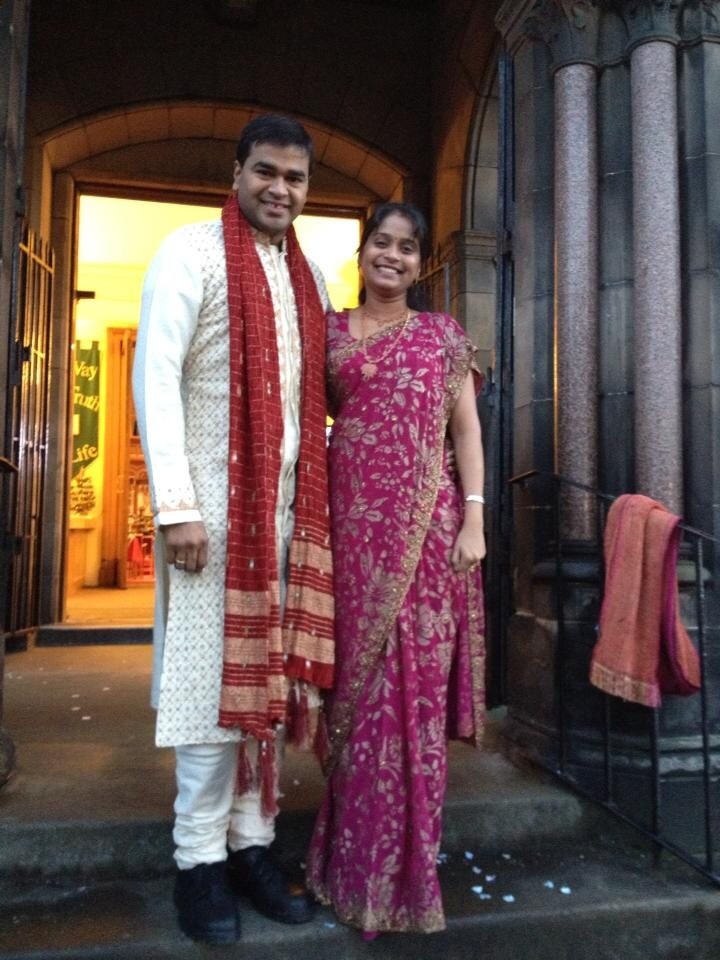 So my mum says ‘We have found a lovely girl’ and sends me two photographs, no makeup on very casual and I liked her straight away. So I agreed to speak to her on the phone and then we set up a video meeting. This isn’t normal of course, usually I’d have gone to her house to meet everyone but I was in Scotland and she was in India. The first time I met her in the flesh I was marrying her; we both had faith in the fact that our families had researched well.
So my mum says ‘We have found a lovely girl’ and sends me two photographs, no makeup on very casual and I liked her straight away. So I agreed to speak to her on the phone and then we set up a video meeting. This isn’t normal of course, usually I’d have gone to her house to meet everyone but I was in Scotland and she was in India. The first time I met her in the flesh I was marrying her; we both had faith in the fact that our families had researched well.
So the legal paperwork side of the marriage was all done on 25th November 2007 and then on 30th March 2008 we held our official ceremony and it was wonderful. Two weeks later she came to live in Scotland with me.”
With Swarna by his side, Praveen started as the assistant restaurant manager of Deseo in Gleneagles in 2007 and loved every minute of it. After 18 months he was promoted to In-Room Dining Manager and it was here that he was to enjoy working with the high-end clientele Gleneagles is famed for.
“John Travolta arrived and I reminded him we’d met in Jamaica. He said ‘No way! Are you kidding me?’ We chatted about Montego Bay and after that I was the person who looked after his son, Jet when he came over to stay. He wrote to me personally after the tragic accident.
We met all sorts of superstars; Elton John, Princess Anne… lots of people. I loved it. I realised I was living my dream. I may have changed America for Scotland but that’s only because I had learned as I grew. So with my goal reached, naturally I was asking ‘What next?’. I had an e-bay business, I cooked for friends and I’d started my cook school demos for certain guests. But I was ready and looking for a new challenge.
That’s when my friend in housekeeping told me about the Ali’s Tandoori place coming up for sale in Perth. I went to see it and almost straight away I gave him my price. I tried to push for a September opening because I couldn’t own a business until a change in my visa had been made. But he said no. It had to be now. Thankfully, Swarna was also keen to open the business; it had become a joint vision! So she left her job in the co-op and became the front of house manager and owner of Tabla! I worked at Gleneagles during the day, 7am to 4pm and then came into Tabla at night to cook.
Suddenly I was using all my skills, cooking the dishes I wanted to cook and offering Perth’s people authentic curries from my home village instead of the UK versions that had been on offer. But the truth is, my position at Gleneagles was a tough one to give up. It was my dream job and our only secure wage. We agreed that once Tabla reached a certain turnover I’d leave. Well I say ‘we’. My wife wasn’t convinced that was the best idea for us and she was probably right!”
As is the way in life, the plan didn’t really matter because in 2011 Swarna discovered she was pregnant with their first child and the turnover became irrelevant! Praveen left Gleneagles and took over the reins of Tabla full time. A decision he is very glad he was forced into making.
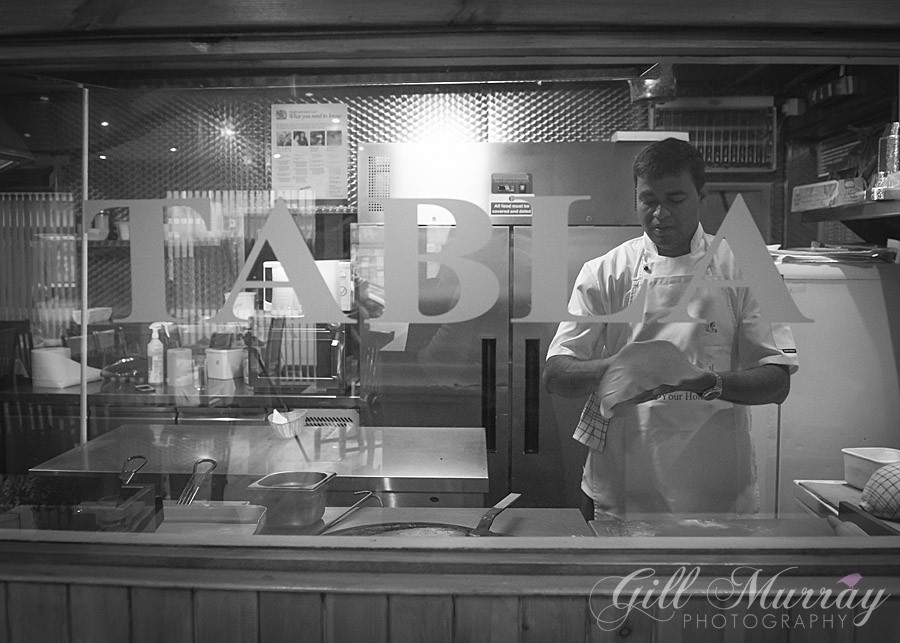
“It has been incredible. Swarna built up the trade and people seem to really like what we do. When we were able to secure the import of the family spices it all felt right, like this was what we were meant to be. We source locally, we cook great food and I’m proud that Sagar, our original cook is still with us and enjoying the success we’ve all worked hard for. My vision for Tabla was to be able to share my experience with my customers, my experience of home cooked Indian food that was tasty and delicious.
When we were awarded our AA rosette for the first time I was over the moon. Raj called me to tell me the inspector had been in when I wasn’t there – I can still feel the impact of that conversation in my ears and in my feet. I was shaking. We’ve recently been awarded the Taste The Best award by Visit Scotland and we’re the only Indian Restaurant in Scotland to have this.”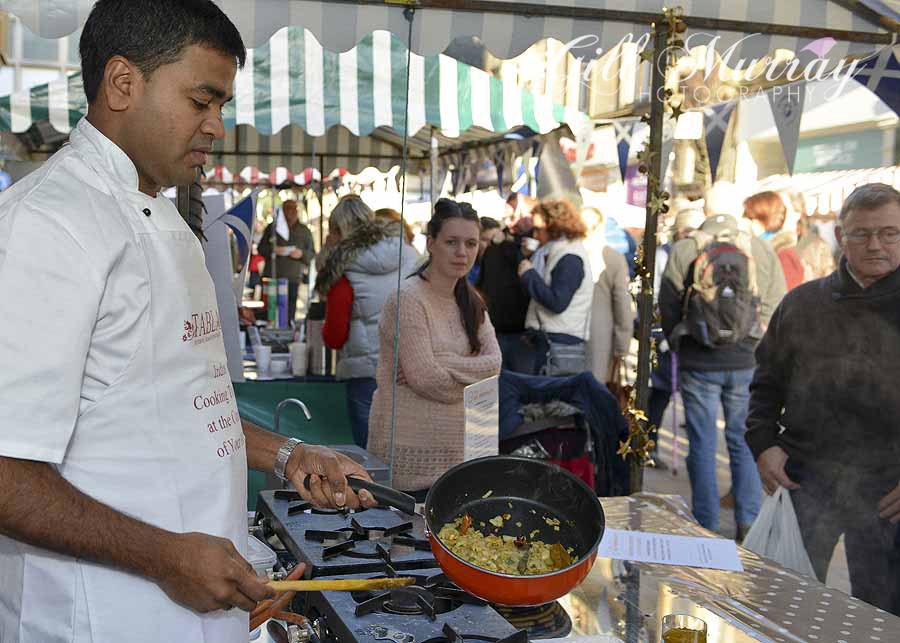
And of course, as we all know Praveen also does Street Food at local markets (here he is at our own #SmallCityRecipes demo!), he does Indian Cook School demos with Sarah Mellerish at Let’s Cook Scotland and he offers authentic Indian Cooking lessons in your own home. Add to this the fact that he is currently planning a frozen curry range that he will sell through delis and butchers and you will begin to realise that when he says ‘What Next?’ he really means it! He is busy, busy, busy.
“Ah but I have mornings off to spend with Tanvi. I’m lucky, I get her to myself for a while when my wife goes to work. After her maternity, Swarna didn’t want to come back to Tabla. The restaurant may have become a joint dream and as much as she was happy to help me to get it running, she is a very smart woman and she needed something for herself. She works at the HSBC Bank now and she enjoys it very much. I occasionally pull her on for a shift but not too often!
Tanvi is like me; she is cheeky and bold. I think I know what my dad felt like now. She’s only three and half and the other day she pulled up a chair to the cupboard and started waving noodles around saying ‘cook these Daddy’.”
He is smiling proudly at the thought of his little girl and her big voice. I ask Praveen what his dad thinks of all this; his life in Scotland with his own business and family.
“He’s okay with it now! He came over after Tanvi was born and we went out to Gleneagles so I could show him the journey I’d had. I think he understands it. That’s important to me, to be a good son and to be mindful of what they sacrificed and the trust and belief they put in me. Others wouldn’t have had my opportunities – I know that.
Swarna and I are bringing up Tanvi to know and love both parts of her culture. She was born in Scotland but we want her to know her Indian heritage. I want her to know my parents and Swarna’s family. At home we speak Telugu and we eat with our hands. She’s bilingual, she has the best of both worlds I think. This summer we’re going out to India for two months so she can play with her cousins in the fields and get to know her family.”
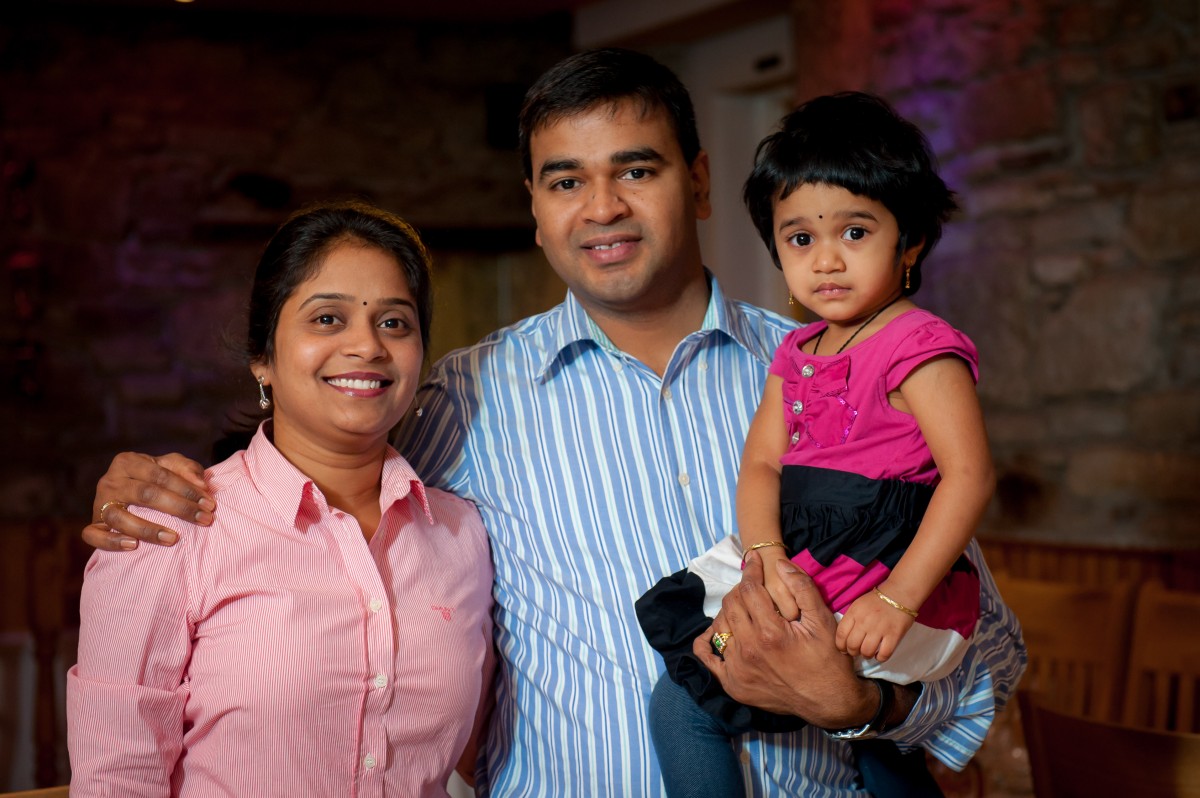 We are on our second round of coffees sitting in Parkland's Back Bar, all the way through our chat he has pointed out photographs of people who have made his journey possible. He is alive with his tale, humbled by the chances he has taken and been afforded. Bold and fearless choices have driven this man we have all come to regard as one of us, a Perth stalwart, Indian accent softened slightly with a wee Scottish twang, occasional snippets of a Perth dialect peppering his chat. He is a respected businessman, a warm and friendly host and a man who loves his wife and daughter above all else.
We are on our second round of coffees sitting in Parkland's Back Bar, all the way through our chat he has pointed out photographs of people who have made his journey possible. He is alive with his tale, humbled by the chances he has taken and been afforded. Bold and fearless choices have driven this man we have all come to regard as one of us, a Perth stalwart, Indian accent softened slightly with a wee Scottish twang, occasional snippets of a Perth dialect peppering his chat. He is a respected businessman, a warm and friendly host and a man who loves his wife and daughter above all else.
I ask him to think about his first glimpse of that photograph that was set his path across the globe to Perth. Did he see it coming?
“I saw enough of it. The vision never left me, it just turned into ‘What Next?’”
***
You can find out more about Tabla Restaurant, Praveen's Indian Cook School and lessons with Let's Cook Scotland by clicking over to the Tabla Directory Listing here on #SCBP and following the links!

Ben Wilde has an impressive resume. At the age of 25 he is director of his own audio business with a solid reputation in the music industry, and a cli
Scott Burton's path from troubled teenager to minister of St Matthews on Tay Street is as surprising as his pink mohawk! Here's how it all happened!
August 10th Friday
Graeme Pallister, Chef Patron of 63 Tay Street in Perth talks about his life's great passions and the road that has brought him to rest at happy.
August 3rd Friday
Read all about Peggy Brunache, the woman behind the soul food at Southern Fried Festival in Perth.
July 20th Friday
SCBP
Perthshire's only online magazine